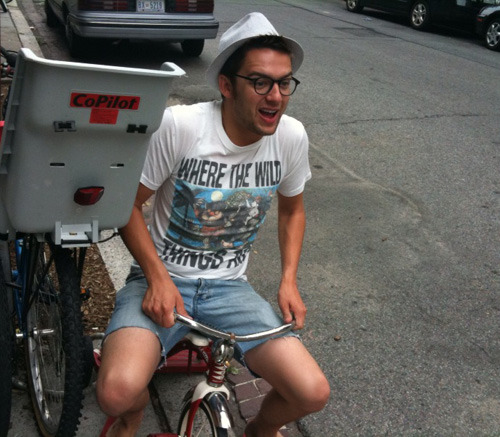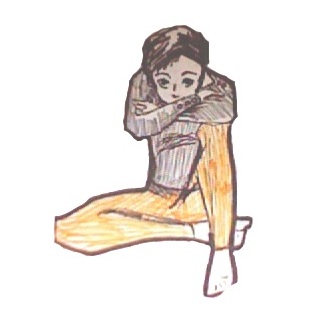I AM SO WORRIED ABOUT THIS, YOU GUYS.
As of late, the entire goddamn world seems to think that this film adaptation of one of the greatest children's books ever (and don't you dare say it isn't) will be a beautifully done, masterful retelling, a creative expansion by some of the best in the business, director Spike Jonze (Adaptation, a shitload of music videos) and writer Dave Eggers (A Heartbreaking Work of Staggering Genius, and the script for Away We Go). I mean, Maurice Sendak is one of the producers, how could it be bad? Well, did you watch the trailer? Did you ever read the book? Let's compare the opening of each:
THE BOOK:
The day Max wore his wolf suit and made mischief of one kind and another, his mother called him "Wild Thing!" and Max said "I'll eat you up!"
THE TRAILER:
Wild Thing: You must have a family.
Max: Yes, I have one of those, but...
Wild Thing: Did you eat them?
Max: No! I have no plans to eat anybody.
Do you see? Do you SEE? From what the trailers have seemed to attest, the story hasn't just been watered-down, it's been desperately altered. Where the Wild Things Are is a book about childhood, about anger and the need to be wild. Being wild doesn't mean wearing a wolf suit, it means being disobediant, loud, obnoxious, angry, and uncontrollable. It's a bit like the original idea of Mardi Gras, how people would have one day to act absolutely insane before bowing into the penance of Lent. The idea is catharsis, which is what happens a lot in childhood. It's what kids get away with that grown-ups can't: kicking and screaming and letting it all out. Max, as the 5-8 year old that he appears to be in the novel, is on the cusp of young adulthood. He could be going back to school, or having to give himself a bath, or do chores. He's having to grow up, and the place where the Wild Things are is his little-boy Neverland, where anger can be let out, where chaos can rule, and where he can be the king of all the Wild Things.
The Wild Things, by the way, aren't the shmaltzy, surrogate-family that the movie makes them out to be. They're the Wild Things, for pete's sake: they roar their terrible roars, they gnash their terrible teeth, they roll their terrible eyes, they show their terrible claws!! I see none of that in the trailer. Once again, they're only wild in that they're furry.
Where Sendak's book is a proper mirror for the frustration and happy chaos of childhood, what Jonze's film seems to be presenting is, to put it bluntly, the ideal Hipster child: Max appears to be quiet, dishevled, precocious, well-spoken, slightly wild but not so much that he forgets to be sad in a totally adorable way. It's what everyone assumes thoughtful artists were when they were kids (or what people who think they're artists were as a kid). But children are hardly like that, and certainly, I would hope, not those who grow up to be the INFP type: children are Wild Things. They're supposed to be. So far, I'm not seeing Max make ANY type of mischief: I'm seeing Max build snow forts and searching for meaning with his big, soulful eyes.
The truth is that I'll never know the quality of the movie itself until it comes out, at which point I'll see it, of course, and then duly report a proper review. What disturbs me the most is that it seems like the epitome of the hipster-ization of certain entertainment. It's no surprise that Sendak's iconic book, which I'm sure most people of my generation had read to them as children, has stayed, lovingly in their hearts. It's something, for example, that you would find under "books" on a Facebook page that isn't so much about how much Where The Wild Things Are influenced said person's lifestyle, but rather as a means of being ironically endearing. But that doesn't mean that the legions of the Hip have any right to claim Where The Wild Things Are as theirs to mold and re-fashion. Changing the central theme, the basic idea behind Sendak's illustrated ten-sentence book, even if you throw an Arcade Fire song on top of it, is a big no-no. Remember when Ron Howard took How the Grinch Stole Christmas and turned it into a big-budget, over-plotted wreck of a movie? Yeah, this could be the same thing, just with a different tint.
My mother gets The New Yorker weekly, and in this issue, the fiction installment is called "Max at Sea", an excerpt from the book that Dave Eggers has written based on his screenplay for the film. This, to me, is an unneccesary amount of convolusion, and I'm wondering how much of that has to do with Egger's hubris, or if the book is actually the novelized equivalent of Sendak's (not, of course, that you'd need an expanded edition. The best thing about Where The Wild Things Are is that it's so short but so damn good despite that, having an expanded edition is like wrapping the most delicious cake in the world with eight feet of bland Reddi-Whip). Anyway, I'll read the story, and hopefully that'll give me a better idea of just what these Hipsters are doing. If it's anything like this:

then we're in some serious trouble.


No comments:
Post a Comment